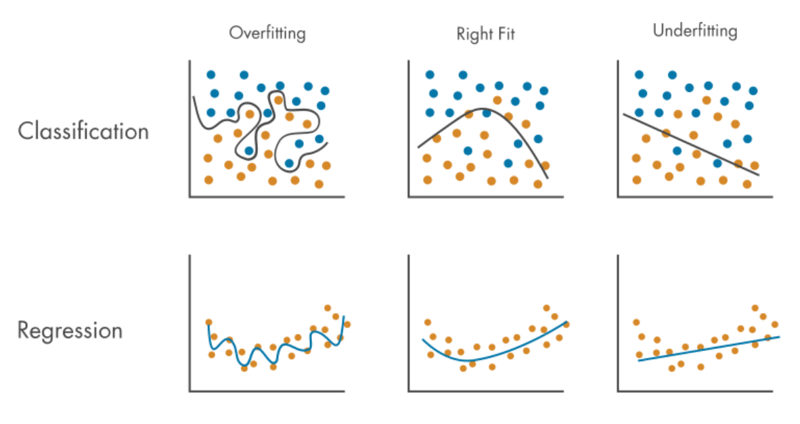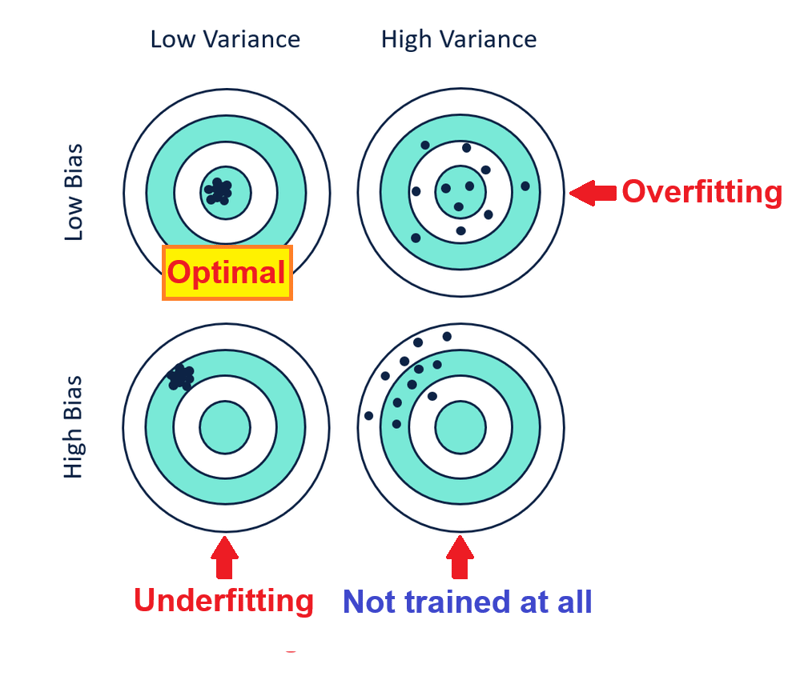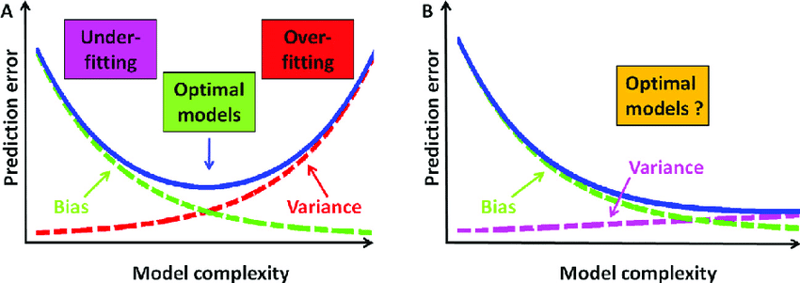Overfitting vs Underfitting
Buy Me a Coffee☕
*Memos:
- My post explains Vanishing Gradient Problem, Exploding Gradient Problem and Dying ReLU Problem.
- My post explains layers in PyTorch.
- My post explains activation functions in PyTorch.
- My post explains loss functions in PyTorch.
- My post explains optimizers in PyTorch.

*Both overfitting and underfitting can be detected by Holdout Method or Cross Validation(K-Fold Cross-Validation). *Cross Validation is better.
Overfitting:
- is the problem which a model can make accurate predictions for train data a lot but a little for new data(including test data) so the model fits train data much more than new data.
- occurs because:
- train data is small(not enough) so the model can only learn a small number of patterns.
- train data is imbalanced(biased) having a lot of specific(limitted), similar or same data but not a lot of various data so the model can only learn a small number of patterns.
- train data has a lot of noise(noisy data) so the model learns the patterns of the noise a lot but not the patters of normal data. *Noise(noisy data) means outliers, anomalies or sometimes duplicated data.
- the training time is too long with a too large number of epochs.
- the model is too complex.
- can be mitigated by:
- larger train data.
- having a lot of various data.
- reduceing noise.
- shuffling dataset.
- stopping training early.
- Ensemble learning.
- Regularization to reduce model complexity:
*Memos:
- There is Dropout (Regularization). *My post explains Dropout layer.
- There is L1 Regularization also called L1 Norm or Lasso Regression.
- There is L2 Regularization also called L2 Norm or Ridge Regression.
- My post explains linalg.norm().
- My post explains linalg.vector_norm().
- My post explains linalg.matrix_norm().
Underfitting:
- is the problem which a model cannot make accurate predictions both for train data and new data(including test data) a lot so the model doesn't fit both train data and new data.
- occurs because:
- the model is too simple(not complex enough).
- the training time is too short with a too small number of epochs.
- Excessive regularization(Dropout, L1 and L2 regularization) is applied.
- can be mitigated by:
- Increasing model complexity.
- Increasing the training time with a larger number of epochs.
- Decreasing regularization.
Overfitting and Underfitting are trade-off:
Too much overfitting mitigation(5., 6. and 7.) leads to underfitting with high bias and low variance while too much underfitting mitigation(1., 2. and 3.) leads to overfitting with low bias and high variance so their mitigation should be balanced as shown below:
*Memos:
- You can also say Bias and Variance are trade-off because reducing bias increases variance while reducing variance increases bias so they should be balanced. *Increasing model complexity reduces bias but increases variance while reducing model complexity reduces variance but increases bias.
- Low bias means high accuracy while high bias means low accuracy.
- Low variance means high precision while high variance means low precision.


The above is the detailed content of Overfitting vs Underfitting. For more information, please follow other related articles on the PHP Chinese website!

Hot AI Tools

Undresser.AI Undress
AI-powered app for creating realistic nude photos

AI Clothes Remover
Online AI tool for removing clothes from photos.

Undress AI Tool
Undress images for free

Clothoff.io
AI clothes remover

Video Face Swap
Swap faces in any video effortlessly with our completely free AI face swap tool!

Hot Article

Hot Tools

Notepad++7.3.1
Easy-to-use and free code editor

SublimeText3 Chinese version
Chinese version, very easy to use

Zend Studio 13.0.1
Powerful PHP integrated development environment

Dreamweaver CS6
Visual web development tools

SublimeText3 Mac version
God-level code editing software (SublimeText3)

Hot Topics
 1664
1664
 14
14
 1422
1422
 52
52
 1316
1316
 25
25
 1268
1268
 29
29
 1240
1240
 24
24
 Python vs. C : Applications and Use Cases Compared
Apr 12, 2025 am 12:01 AM
Python vs. C : Applications and Use Cases Compared
Apr 12, 2025 am 12:01 AM
Python is suitable for data science, web development and automation tasks, while C is suitable for system programming, game development and embedded systems. Python is known for its simplicity and powerful ecosystem, while C is known for its high performance and underlying control capabilities.
 Python: Games, GUIs, and More
Apr 13, 2025 am 12:14 AM
Python: Games, GUIs, and More
Apr 13, 2025 am 12:14 AM
Python excels in gaming and GUI development. 1) Game development uses Pygame, providing drawing, audio and other functions, which are suitable for creating 2D games. 2) GUI development can choose Tkinter or PyQt. Tkinter is simple and easy to use, PyQt has rich functions and is suitable for professional development.
 The 2-Hour Python Plan: A Realistic Approach
Apr 11, 2025 am 12:04 AM
The 2-Hour Python Plan: A Realistic Approach
Apr 11, 2025 am 12:04 AM
You can learn basic programming concepts and skills of Python within 2 hours. 1. Learn variables and data types, 2. Master control flow (conditional statements and loops), 3. Understand the definition and use of functions, 4. Quickly get started with Python programming through simple examples and code snippets.
 Python vs. C : Learning Curves and Ease of Use
Apr 19, 2025 am 12:20 AM
Python vs. C : Learning Curves and Ease of Use
Apr 19, 2025 am 12:20 AM
Python is easier to learn and use, while C is more powerful but complex. 1. Python syntax is concise and suitable for beginners. Dynamic typing and automatic memory management make it easy to use, but may cause runtime errors. 2.C provides low-level control and advanced features, suitable for high-performance applications, but has a high learning threshold and requires manual memory and type safety management.
 How Much Python Can You Learn in 2 Hours?
Apr 09, 2025 pm 04:33 PM
How Much Python Can You Learn in 2 Hours?
Apr 09, 2025 pm 04:33 PM
You can learn the basics of Python within two hours. 1. Learn variables and data types, 2. Master control structures such as if statements and loops, 3. Understand the definition and use of functions. These will help you start writing simple Python programs.
 Python and Time: Making the Most of Your Study Time
Apr 14, 2025 am 12:02 AM
Python and Time: Making the Most of Your Study Time
Apr 14, 2025 am 12:02 AM
To maximize the efficiency of learning Python in a limited time, you can use Python's datetime, time, and schedule modules. 1. The datetime module is used to record and plan learning time. 2. The time module helps to set study and rest time. 3. The schedule module automatically arranges weekly learning tasks.
 Python: Automation, Scripting, and Task Management
Apr 16, 2025 am 12:14 AM
Python: Automation, Scripting, and Task Management
Apr 16, 2025 am 12:14 AM
Python excels in automation, scripting, and task management. 1) Automation: File backup is realized through standard libraries such as os and shutil. 2) Script writing: Use the psutil library to monitor system resources. 3) Task management: Use the schedule library to schedule tasks. Python's ease of use and rich library support makes it the preferred tool in these areas.
 Python: Exploring Its Primary Applications
Apr 10, 2025 am 09:41 AM
Python: Exploring Its Primary Applications
Apr 10, 2025 am 09:41 AM
Python is widely used in the fields of web development, data science, machine learning, automation and scripting. 1) In web development, Django and Flask frameworks simplify the development process. 2) In the fields of data science and machine learning, NumPy, Pandas, Scikit-learn and TensorFlow libraries provide strong support. 3) In terms of automation and scripting, Python is suitable for tasks such as automated testing and system management.




